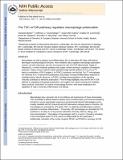The TSC-mTOR pathway regulates macrophage polarization
Author(s)
Byles, Vanessa; Covarrubias, Anthony J.; Ben-Sahra, Issam; Lamming, Dudley W.; Manning, Brendan D.; Horng, Tiffany; Sabatini, David; ... Show more Show less
DownloadSabatini_The TSC-mTOR.pdf (1.955Mb)
PUBLISHER_POLICY
Publisher Policy
Article is made available in accordance with the publisher's policy and may be subject to US copyright law. Please refer to the publisher's site for terms of use.
Terms of use
Metadata
Show full item recordAbstract
Macrophages are able to polarize to proinflammatory M1 or alternative M2 states with distinct phenotypes and physiological functions. How metabolic status regulates macrophage polarization remains not well understood, and here we examine the role of mTOR (mechanistic target of rapamycin), a central metabolic pathway that couples nutrient sensing to regulation of metabolic processes. Using a mouse model in which myeloid lineage-specific deletion of Tsc1 (Tsc1[superscript Δ/Δ]) leads to constitutive mTOR complex 1 (mTORC1) activation, we find that Tsc1[superscript Δ/Δ] macrophages are refractory to IL-4-induced M2 polarization, but produce increased inflammatory responses to proinflammatory stimuli. Moreover, mTORC1-mediated downregulation of Akt signalling critically contributes to defective polarization. These findings highlight a key role for the mTOR pathway in regulating macrophage polarization, and suggest how nutrient sensing and metabolic status could be ‘hard-wired’ to control of macrophage function, with broad implications for regulation of type 2 immunity, inflammation and allergy.
Date issued
2013-11Department
Massachusetts Institute of Technology. Department of Biology; Whitehead Institute for Biomedical Research; Koch Institute for Integrative Cancer Research at MITJournal
Nature Communications
Publisher
Nature Publishing Group
Citation
Byles, Vanessa, Anthony J. Covarrubias, Issam Ben-Sahra, Dudley W. Lamming, David M. Sabatini, Brendan D. Manning, and Tiffany Horng. “The TSC-mTOR Pathway Regulates Macrophage Polarization.” Nature Communications 4 (November 27, 2013).
Version: Author's final manuscript
ISSN
2041-1723